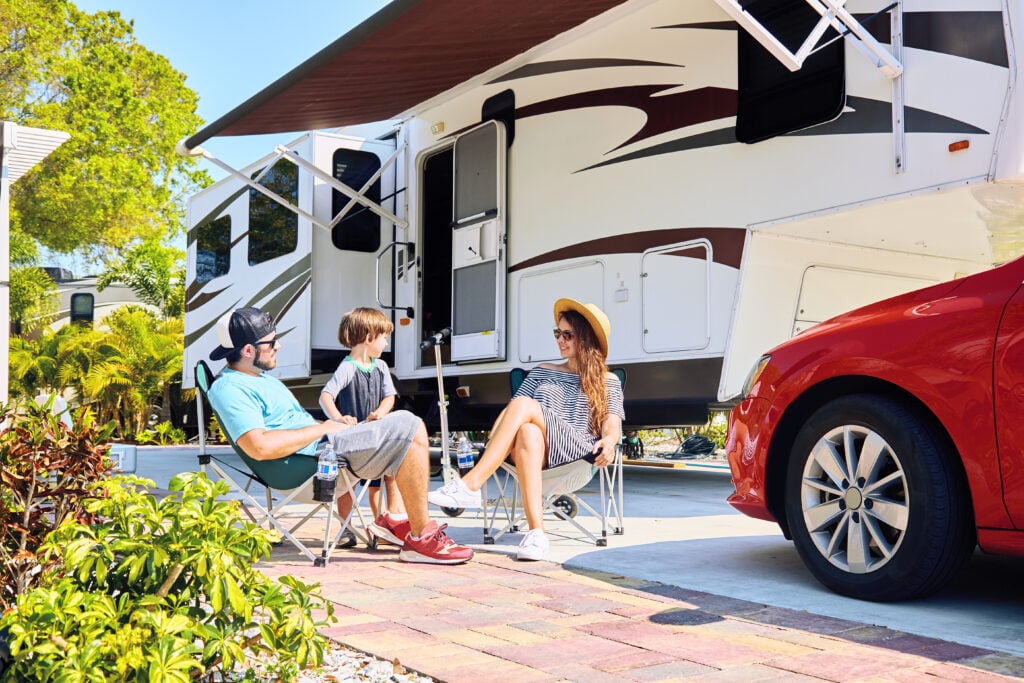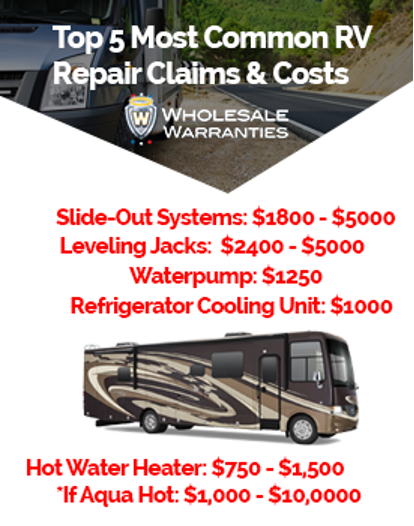
Sponsored by Wholesale Warranties
The Best Time to Buy an RV Warranty?
When you begin looking into RV warranty coverage, you’ll likely find the answers to common questions. For example, what is an RV warranty? How much will it cost? How do I find one I can count on? But something that is commonly missing from the equation is…when? Timing matters when it comes to locking in your RV warranty coverage. The RV protection experts at Wholesale Warranties explain in this article.
When can I buy a warranty policy?
As an RVer, you have a few different options when it comes to buying an RV warranty. While many travelers feel their only chance to secure coverage is from their dealership at the same time they’re purchasing the RV, this isn’t actually the case! In fact, with many providers, you can lock in coverage at pretty much any stage of your RV life.
When you work with an online broker like Wholesale Warranties, you can get a quote for coverage on brand new units. You can also get one for used RVs, dealership purchases, private party purchases, and more. From here, you’ll want to look at the question of “when” as it pertains to getting the best possible rate on your unit.
The age of your RV matters. What does this mean for RV warranty coverage?
RV protection providers look at a variety of factors when determining the cost of an extended warranty. Among these qualities you’ll find make, model, mileage (when applicable), as well as age of the unit.
Generally speaking, the older an RV is, the more likely it is to suffer major mechanical failures. This drives up the cost of extended warranty protection. That’s because underwriters know they will be paying for a larger number of claims on these units. Check out this image to see the most common RV repairs and their costs as compiled by RV warranty leaders.
Conversely, brand new units have premium pricing. This is because a major mechanical failure is less common based on age. Learn more about this below. So, simply put, time is of the essence! The earlier you invest in coverage, the better your rate will be.

Use timing to find great coverage at great rates
Further, there is also a time of year you should keep in mind if you plan to wait it out on coverage. As an RV industry standard, with the exception of brand-new units, all RVs are considered one model year older on January 1st of each new year. This is regardless of when they were purchased, how much manufacturer warranty is remaining, or any other extenuating circumstances.
With the age of your RV automatically increasing, it is always recommended that if you don’t have coverage as winter approaches—you lock some in by the end of the year! If you choose to wait until the new year, you will be paying more for the same coverage. Even further, some RVs will age out of eligibility altogether, meaning you may qualify for coverage today that you won’t be able to get in the next calendar year. If you’re wondering whether or not you qualify, you can work with Wholesale Warranties on a free quote to learn more about your options.
All RVs are considered one model year older on January 1st of each new year—regardless of when they were purchased.
What if I store my rig?
I know what you might be thinking: I usually put my rig in storage for the winter, why would I buy an RV warranty when I’m not going to use the vehicle for months? RV warranty providers find they pay a bulk of claims in spring, particularly on units that have just come out of winter storage.
RVs are not designed to sit, unused, for months on end, and when they do, you’ll find they often start to suffer failures. If you lock in your RV protection before your rig goes into storage, any failed items you find in the new year will be covered per the terms of your contract! If you wait, you’ll be paying for the repairs and the protection.
My RV is brand new. Should I wait until manufacturer coverage expires before buying?
This all comes down to cost. To put it plainly, you will never get a longer term for a better coverage level at a lower rate than when you buy an extended warranty while your rig is brand new.
Extended RV warranty providers consider the model year and in-service date of your vehicle when working up a cost for your coverage. They know the manufacturer warranty takes precedence for repairs. This is particularly true during the first year you own the rig. And that’s why they offer great protection rates to these units. When your rig is brand new, you can secure your policy. It’s possible even up to 7 years of coverage. And you can get these premier rates.
Now, you might be asking yourself, won’t I have overlapping coverage between the manufacturer policy and my RV extended warranty? And the answer is yes! However, the cost savings on your policy might mean this isn’t such a bad thing. Plus, keep in mind any repairs that aren’t covered by your manufacturer can be pushed to your extended protection.
What About Additional RV Warranty Benefits?
Even more, based on your specific contract, you might be eligible to use additional benefits even if repairs are going to your manufacturer policy. Again, this will vary based on where you buy the contract, but providers like Wholesale Warranties include additional benefits in their contracts, such as RV Roadside Assistance, Tire and Wheel Protection and RV Tech Assistance.
The manufacturer may be your first line of defense while their coverage is in place. But those warranties are not designed to help you out with situations like blown tires, towing needs, lockout services, and more. Secure your RV extended warranty right away. Then you can utilize these services should you need them at any time during your policy term.
View this post on Instagram
Conclusion
So, should you wait to purchase RV protection? That’s a call you’ll have to make. But you should make that choice knowing how it may affect the price and term of your extended RV warranty. Click here to get a quote for coverage from Wholesale Warranties. Learn more about your coverage option today!


Considering the current delays at RV repair facilities, having a warranty might cover costs but won’t make repairs any faster. Most warranty companies will not pay if the owner performs their own repairs. A policy that makes no financial sense, unless the warranty company is counting on owners to do their own repairs. Sorta a catch-22, deal with a repair facility and the 4-6 month delay, or fix it yourself, forgo the reimbursement, and have the RV for most of the season.
Put your money in a savings account. RV warranty are a waste of money. So many exceptions and very lengthy contract. All I figured out is it may cover appliances but not much else.
If you buy RV insurance, Read the policy well, to sure they are covering the entire RV,( air conditioner, stove, refrig. and so forth. and not just the vehicle.
They came out and inspected my RV, everything was good, they did a complete check on everything, Air condition, Heater, Micro, water system, outside awning, Took it for a ride, etc. The inspection cost me $400.00
I learned the hard way, I missed that line in the contract.
I cancelled, but still lost money on it. $400.00 for the inspection, non refundable , plus they prorated my refund.
“should you wait to purchase RV protection? ”
ABSOLUTELY! I bought my Super-C 7.5 years ago and did NOT get suckered on any “Extended Warranty” (which in fact is NOT a warranty but IS a “Service Contract). Instead, I chose to “Self Insure” and, still have not used up the money I srt aside.
If you decide to purchase, check to see if repairs require pre-approval. This can cause a lengthy delay in starting repairs. The repair shop submits the request for approval after the problem is diagnosed, then the insurance company has 2 business days for review, and potentially longer if they decide to send out an adjuster to look at the unit. Repairs can’t begin and parts can’t be ordered until the approval is received. We just spent a week at a hotel waiting for approval when our rig broke down during a trip.